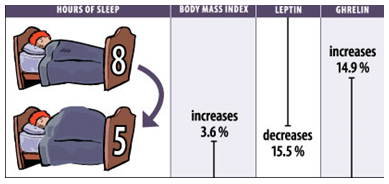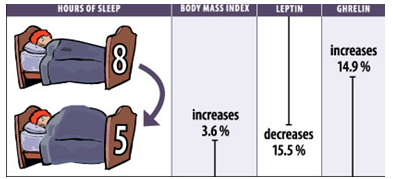-
Do you sometimes find you want to eat chocolate or ice cream very much? Do you then make it but feel guilty about it later?
The next time this happens to you, think back if you have had enough sleep over the last 3-5 days. Many adults and even teens have noticed that they crave "midnight snacks" when working or watching TV late.
New research shows that lack of sleep could lead us to have an increased appetite (食欲)- especially for the unhealthy kind.
Recently, researchers at the University of Chicago carried out a study that clearly shows that a lack of sleep actually changes our brain chemistry! Studies were done on two control groups over four days. Both groups had their food and sleep strictly controlled. All of them received three meals. The only difference was that one group was allowed to sleep for 7.5 hours while the other group slept for a little more than four hours.
During the following visit, their sleep patterns were exchanged. After the last night of the session, the volunteers were offered as much food as they wanted to eat. Researchers noticed that in both sessions, people who sleep less ate on an average 300 calories more than those who had slept more. This was much more calories than what their bodies would need to make up for the three fewer hours of sleep.
What Is Going On?
The researchers then analyzed the chemicals (化学成分) in the blood of the people in the study. What they noticed was surprising. High levels of ghrelin (a chemical that makes us hungry) and lower levels of leptin (the chemical that tells the brain that it is satisfied) were found in the people with less sleep.
Even more surprising was that this group had higher levels of endocannabinoids - the same chemical that is caused by drugs such as cannabis (大麻). The endocannabinoid system causes a craving for sugar and fatty foods and leads to overeating even when the body is not hungry. This study suggests that sleep changes help produce chemicals in the body that are similar to taking drugs!
Furthermore, researchers noticed that food cravings continued for a long period of time, well after the lack of sleep. This increases the risk of over-eating for longer periods, leading to obesity (肥胖).
Your body needs 7-8 hours of sleep each night. So, the next time you reach for a bag of chips or a slice of decadent cake, think of the amount of sleep you have had recently!

1.According to the passage, people want to eat more when they ________.
A.work B.watch TV C.sleep less D.sleep more
2.The word ‘crave’ in paragraph 2 most probably means ________.
A.hope B.want C.hate D.dislike
3.From the passage, we can learn that ________.
A.people feel guilty about eating chocolate
B.unhealthy food makes people sleep less and less
C.a person’s sleep has nothing to do with his/her appetite
D.a study about sleep and obesity was carried out at the University of Chicago
4.The chemical that makes us feel hungry is called ________.
A.ghrelin B.leptim
C.cannabis D.endocannabinoids
5.This article is mainly about ________.
A.researchers working on people’s sleep
B.how people’s sleep influences their appetite
C.how much people need to eat after sleeping less
D.A research about chemicals in the blood of people
-
阅读理解。
Do you sometimes find you want to eat chocolate or ice cream very much? Do you then make it but feel guilty about it later?
The next time this happens to you, think back if you have had enough sleep over the last 3-5 days. Many adults and even teens have noticed that they crave "midnight snacks" when working or watching TV late.
New research shows that lack of sleep could lead us to have an increased appetite (食欲)- especially for the unhealthy kind.
Recently, researchers at the University of Chicago carried out a study that clearly shows that a lack of sleep actually changes our brain chemistry! Studies were done on two control groups over four days. Both groups had their food and sleep strictly controlled. All of them received three meals. The only difference was that one group was allowed to sleep for 7.5 hours while the other group slept for a little more than four hours.
During the following visit, their sleep patterns were exchanged. After the last night of the session, the volunteers were offered as much food as they wanted to eat. Researchers noticed that in both sessions, people who sleep less ate on an average 300 calories more than those who had slept more. This was much more calories than what their bodies would need to make up for the three fewer hours of sleep.
What Is Going On?
The researchers then analyzed the chemicals (化学成分) in the blood of the people in the study. What they noticed was surprising. High levels of ghrelin (a chemical that makes us hungry) and lower levels of leptin (the chemical that tells the brain that it is satisfied) were found in the people with less sleep.
Even more surprising was that this group had higher levels of endocannabinoids - the same chemical that is caused by drugs such as cannabis (大麻). The endocannabinoid system causes a craving for sugar and fatty foods and leads to overeating even when the body is not hungry. This study suggests that sleep changes help produce chemicals in the body that are similar to taking drugs!
Furthermore, researchers noticed that food cravings continued for a long period of time, well after the lack of sleep. This increases the risk of over-eating for longer periods, leading to obesity (肥胖).
Your body needs 7-8 hours of sleep each night. So, the next time you reach for a bag of chips or a slice of decadent cake, think of the amount of sleep you have had recently!

1.According to the passage, people want to eat more when they ________.
A.work B.watch TV
C.sleep less D.sleep more
2.The word ‘crave’ in paragraph 2 most probably means ________.
A.hope B.want
C.hate D.dislike
3.From the passage, we can learn that ________.
A.people feel guilty about eating chocolate
B.unhealthy food makes people sleep less and less
C.a person’s sleep has nothing to do with his/her appetite
D.a study about sleep and obesity was carried out at the University of Chicago
4.The chemical that makes us feel hungry is called ________.
A.ghrelin B.leptim
C.cannabis D.endocannabinoids
5.This article is mainly about ________.
A.researchers working on people’s sleep
B.how people’s sleep influences their appetite
C.how much people need to eat after sleeping less
D.A research about chemicals in the blood of people
-
What do you want to be in ________ future? How about ________ ice-cream taster?
A.a; a B.the; a C.the; an D.the; the
-
She wants________some ice-cream now.
A. eat B. eats C. eating D. to eat
-
If you ________ too much ice cream, you will feel sick.
A. eats B. eat C. to eat D. eating
-
If you _________ too much ice cream, you will feel sick.
A. eats B. eat
C. to eat D. eating
-
Would you like ________ ice cream now?
A.eat B.ate C.eating D.to eat
-
A: Hey, Gina. Do you want some ice cream? B : No, thanks. 71 A: Really? Where are you going? B: I'm going to play baseball. Do you want to come? A: Sorry, I can't. 72 B : Well, come later then. We're playing all afternoon. A: 73 But I'm not very good at baseball. B : Don't worry about that. 74 You can just watch
Come on, it'll be fun. A: Well, OK. 75 B: OK. See you!
| A.It sounds nice. B.See you later. C.I need to studv. D.I'm going out. E.I don't think so. F.You don't have to play. G.You can do that again. |
-
Do you want to be healthier? Then go through the passage, and you may find it’s easy 1.fit.
1).Eat all kinds of foods, especially fruits and vegetables.
You may have a favourite kind of food, but the best 2.is to eat as many kinds as possible. If you eat 3. foods, you’re more likely to get the nutrients your body needs . Taste new foods that you 4. tried before. Some foods, such as green vegetables, are very important. Have five servings(份) of fruits and three vegetables.
2)Drink water and milk often.
When you are really 5.,cold water is the No. 1 choice. Kids need calcium(钙) to grow strong, and milk is a great source of this mineral (矿物质) . How much do children6.? About three glasses of milk every day.
3) Limit screen time.
What’s screen time? It’s the 7.for watching TV, DVDs, and videos, 8.
computer games, and using the computer. If you spend much time 9. these activities, you may have less time left to take 10., such as playing basketball, bicycling, and swimming.
-
— Do you want to eat out, ________ would you rather stay at home?
— It’s up to you.
A.but B.and C.or D.so

